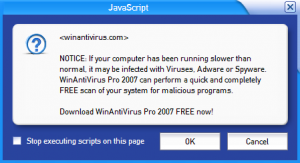 Computer users would be well advised to remember TANSTAAFL when they’re online. TANSTAAFL, an acronym popularized by Robert A. Heinlein in his 1966 novel, The Moon is a Harsh Mistress, translates to: “There ain’t no such thing as a free lunch.”
Computer users would be well advised to remember TANSTAAFL when they’re online. TANSTAAFL, an acronym popularized by Robert A. Heinlein in his 1966 novel, The Moon is a Harsh Mistress, translates to: “There ain’t no such thing as a free lunch.”
A fairly common “free lunch” on the Internet is a popup that warns you that your computer is infested with all sorts of nasty programs that are doing all sorts of nasty things, from slowing down your machine to giving criminals all the information they need to clean out your bank account. But the popup offers a FREE solution to your problems – a FREE scan that will find and eradicate all of the bad stuff hiding out in your machine. That FREE scan invariably finds scores of problems with your computer. And now all you need to do to get rid of those problems is to “register” the software. The FREE solution ends up costing you $40 to $60. But it was worth it, wasn’t it, to get rid of malware and adware and spyware?
The problem is, the WinFixer® or WinAntiVirus® you downloaded didn’t actually find anything on your computer. In fact the software never even looks. And if there were any malicious software on your computer, neither program would do anything about it. In fact, the software would “find” malware on a computer that had never before been connected to the Internet. But WinFixer® and others of its ilk were not actually designed to fight malware. The programs were written to frighten you into parting with some of your money.
Innovative Marketing, the company behind WinFixer® and others, has been fined more than $163 million for tricking consumers into buying their product. The Fourth U.S. Circuit Court of Appeals, upholding a lower court decision, said the company used “scareware” tactics to convince people that their computers were infected and banned the company founder and vice president, Kristy Ross, from selling any type of computer security software or any software that interferes with a consumer’s computer use. The court also prohibited Ross using any form of deceptive advertising. (insert link to the official cite for the case ruling) Two others involved in the Innovative Marketing scam were ordered to give up more than $8 million in ill-gotten gains.
The appeals court ruling may stop Innovative Marketing from preying on computer users, at least under that name. But other scammers know that these tactics work, so the fraudulent scheme is unlikely to disappear any time soon.
The signs of a scareware scam are easy to spot. The Federal Trade Commission issued a list of warning signs of the fraudulent practice:
You get ads that promise to “delete viruses or spyware,” “protect privacy,” “improve computer function,” “remove harmful files,” or “clean your registry.”
You get “alerts” about “malicious software” or “illegal pornography on your computer.”
You are invited to download free software for a security scan or to improve your system.
You get pop-ups that claim your security software is out-of-date and your computer is in immediate danger.
You suddenly encounter an unfamiliar website that claims to have performed a security scan and prompts you to download new software.
If a popup appears on your screen that is remotely similar the one above, do not click on it. The “X” in the upper right corner, as well as the “Cancel” button, likely will not close the ad, since the entire box is generally a link to the scammer’s Web site. To be safe, force quit your browser by using the three-finger salute on a PC: Control, Alt, Delete. On a Mac, hit Command, Option, Q, Escape.
Always remember TANSTAAFL.
 Chicago Business Attorney Blog
Chicago Business Attorney Blog


